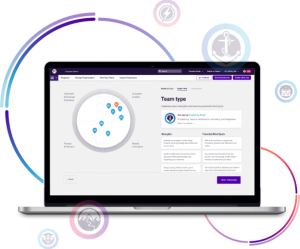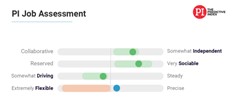
The team at the Basement Project “are buzzing about being an Anchoring Team”
 The Basement Project is an independent charity local to Worcestershire in the UK. It supports young people under the age of twenty-five who are in crisis, homeless, at risk of homelessness, and in resolving the many contributing factors such as sustaining tenancy, job retention, finances, relationships, physical health and mental wellbeing. The organisation provides a safe and secure environment, and offers much needed stability to young people in need. Being a smaller organisation, a well-functioning team is even more important to the efficient and effective running of the charity.
The Basement Project is an independent charity local to Worcestershire in the UK. It supports young people under the age of twenty-five who are in crisis, homeless, at risk of homelessness, and in resolving the many contributing factors such as sustaining tenancy, job retention, finances, relationships, physical health and mental wellbeing. The organisation provides a safe and secure environment, and offers much needed stability to young people in need. Being a smaller organisation, a well-functioning team is even more important to the efficient and effective running of the charity.
As an Elite Certified Partner of The Predictive Index (PI), at RPX2, we are passionate about helping our clients to leverage scientific data to become talent optimized, and make even better people decisions. So, when Jerry Robinson, the new Chief Executive Officer at The Basement Project, approached us to facility a team analytics session for his new team, we were happy to assist.
Jerry and Michael Jones, an experienced PI Consultant and Director at RPX2, have enjoyed a close business relationship since 2005. Jerry has been an advocate of The Predictive Index (PI) and its methodology ever since. “The problem with many behavioural profiling tools is that they are here today and gone tomorrow. But PI has stood the test of time.”
Whenever possible, Jerry has introduced PI – and the use of people analytics – into his new organisations. So, when he started his position as CEO for The Basement Project, it felt only natural to reach out to Michael.
As a leader, Jerry has always promoted the ‘people first, task second’ principle. It was therefore hugely important to him to learn as much as possible about each new team member and for them to get to know him better – and quickly.
Michael suggested to run a virtual PI Discover your Team Type session with Jerry and his team. As part of the workshop preparation, every team member was asked to complete a PI Behavioral Assessment. The tool provides insights into an individual’s motivational needs and core drives, and helps to predict their likely workplace behaviour. Invaluable information for a manager in a new role to have at their fingertips!
 The PI Behavioral Assessment celebrates an individual’s superpowers rather than asking them to be something that they are not. Knowing how each team member prefers to work, what makes them tick, and what they need to be successful, creates a culture of self-awareness, and awareness of others. It fosters mutual respect.
The PI Behavioral Assessment celebrates an individual’s superpowers rather than asking them to be something that they are not. Knowing how each team member prefers to work, what makes them tick, and what they need to be successful, creates a culture of self-awareness, and awareness of others. It fosters mutual respect.
In one of the exercises during the team session, Michael describes a behavioural profile, and the participants are asked to decide which colleague it might belong to. Team members were able to identify with, and understand, the behaviours linked with their profiles in an entirely non-judgemental environment.
As Jerry says: “Your behavioural profile is your behavioural profile. It’s not good or bad, and it’s not going to change. You need to celebrate what you are good at and who you are.” What an empowering thought!
The Discover your Team Type workshop is the first in the PI High Performance series. It leverages scientifically-backed people data from the new PI Team Discovery. Jerry was impressed: “The enhanced team features in the PI Software make it really easy to see where someone sits within a team behaviourally, and then in relation to the work to be done.”
 The Team Discovery tool uses individual behavioural data to determine the collective behavioural profile of a team – the Team Type. PI have identified nine Team Types. Jerry’s team “are buzzing about being an Anchoring Team“.
The Team Discovery tool uses individual behavioural data to determine the collective behavioural profile of a team – the Team Type. PI have identified nine Team Types. Jerry’s team “are buzzing about being an Anchoring Team“.
The natural strength of an Anchoring Team comes from the ability to strike a balance between process and people. It is easy to see why that collective behavioural profile would work well in teams that operate in the not-for-profit sector.
Adhering to legal directives, accountability and providing reporting for funders is crucial. But charities like The Basement Project are also inherently people oriented. They play a vital role in improving people’s wellbeing and supporting communities at a local level.
One of the challenges that comes with being an Anchoring Team is that occasionally their need to put together processes to solidify internal protocols may come at the cost of agility. In times of unexpected change or pressures, it may be necessary to occasionally break from the existing protocol to expedite things.
In that context, Michael’s impartial presence helped the team to openly start addressing questions like: We have all these insights into our team but what are we going to do with them? What do they mean for us? How can we work even better as a team and play to our strengths? What do we need to change, if anything?
Being a PI Master himself, Jerry could have easily given the individual Behavioral Assessment feedbacks and run the team session himself. But bringing Michael in as a facilitator provided a third-party view that Jerry found extremely helpful. Michael’s vast experience with PI, his infectious personality, and his ability to read the room added another dimension. It helped to create a safe space where team members felt comfortable to freely ask probing and sometimes challenging questions.
Jerry’s new team is made up of people with behavioural profiles that he has less experience in working with. With the help of PI, he was instantly able to determine whether and how he needed to adapt his leadership and communication style to gain their trust and get the best out of them. He could anticipate and address any potential challenges before they even arose.
At the same time, the objective data shared in the session helped the team to glean important information about Jerry’s likely leadership, and preferred communication and work style. They learned what to expect.
The team session helped to accelerate Jerry’s relationship with the team. The PI data provided instant and reliable insights into the individual needs and motivations of this team members, which might otherwise have taken weeks to work out. The Discover your Team Type workshop resulted in an effective bonding and team building exercise, and has set the tone for full transparency and awareness for the journey ahead.
It has also already helped to create a common language around PI at The Basement Project. Without Michael’s third-party involvement, the use of behavioural assessment tools might have been dismissed as ‘the new guy trying to put his stamp on things’. Now, Jerry feels that it has opened the team up to potentially using behavioural tools in other areas.
 Going forward, Jerry is hoping to introduce the PI Job Assessment tool to create the behavioural and cognitive requirements for the various volunteer roles at The Basement Project. Jerry is pleased to report that there are many willing and wonderful volunteers out there. However, for the sake of all parties involved, it’s important to set them up for success by matching the requirements of the role to the behavioural characteristics of the volunteer.
Going forward, Jerry is hoping to introduce the PI Job Assessment tool to create the behavioural and cognitive requirements for the various volunteer roles at The Basement Project. Jerry is pleased to report that there are many willing and wonderful volunteers out there. However, for the sake of all parties involved, it’s important to set them up for success by matching the requirements of the role to the behavioural characteristics of the volunteer.
For instance, a volunteer operating in the fundraising space needs to quickly build relationships with others while handling repeated rejection. Manning a job application station for young people requires plenty of energy and enthusiasm. A volunteer coordinator needs to be people-oriented, work towards the targets and make independent decisions.
“If you have access to reliable tools that tell you so much about someone’s core motivational needs and likely workplace behaviour, as a leader, why wouldn’t you use them?” Jerry is looking forward to continue to learn more about his team and their needs, and thereby optimize how to best support young people.
Find out more about Jerry’s journey with The Predictive Index, and why he sees PI as more than a recruitment tool in the next article.